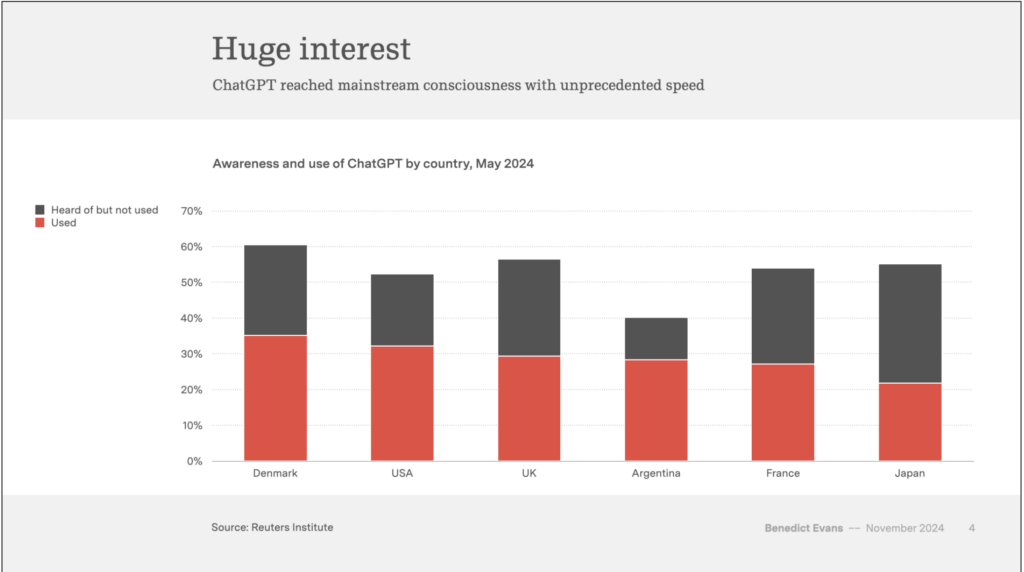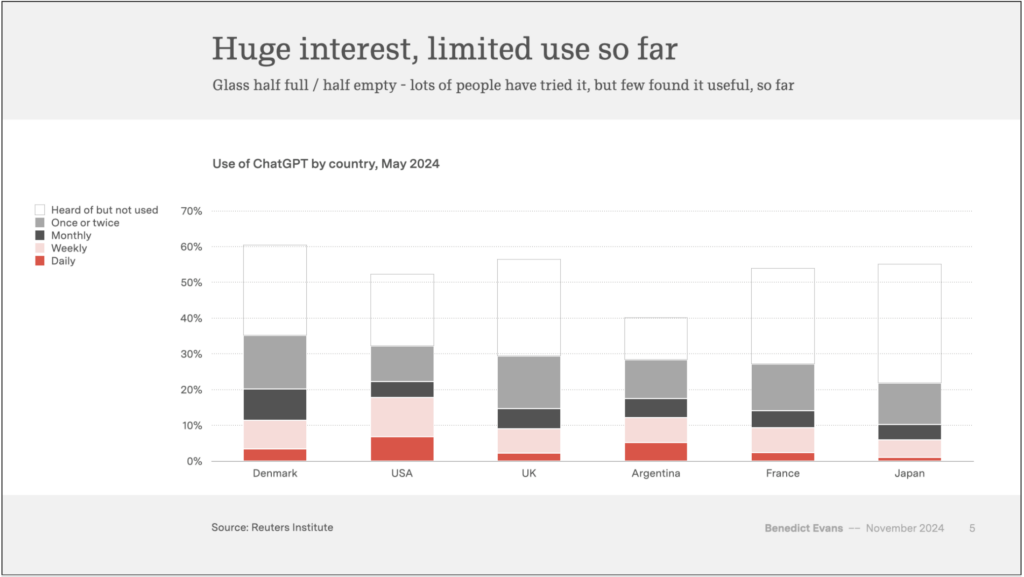Table of Contents
What if everything you knew about the adoption of AI was wrong? The latest presentation from Benedict Evans contained some real truth bomb relation to conventional wisdom regarding the effect that AI is going to have on the world. Here are some of the most provocative insights to make you re-evaluate everything when it comes to AI’s future.
1. The Big AI Paradox: Everyone’s Doing It, Nobody’s Using It
Here’s a shocker: Despite ChatGPT going viral and receiving endless media coverage, the majority of people use it once. Evans reveals how this sets up a fascinating paradox: AI has achieved unprecedented awareness- one-third to two-thirds of people globally have tried ChatGPT-but minimal sustained usage. It’s like we’ve built the world’s most advanced Swiss Army knife, and everyone’s using it to open letters.


The real kicker? This is not a failure; this is exactly how revolutionary technologies emerge. Think about that for a second.
2. Money Talks: The $500 Billion Bet That Makes No Sense (Yet)
Ready for some numbers that will blow your mind? OpenAI reached a $160 billion valuation faster than Microsoft reached $150 billion by about 23.5 years. That’s not a typo.
But here’s where it gets wild: The tech industry is pouring hundreds of billions into AI despite having no clear idea how they’ll make money from it. Evans quotes a Silicon Valley executive: “I don’t want to live in a world where other people are advancing faster than we are.” This isn’t investment’s existential FOMO on an unprecedented scale.
3. The Dark Secret of Enterprise AI: No One Knows What They’re Doing
Forget those confident predictions about AI transformation. Evans reveals that even the biggest companies are basically throwing spaghetti at the wall. When Accenture brags about $1 billion in quarterly AI work, they can’t even define what counts as “AI work.”
The punchline? We’re asking users to figure out how to use AI—the exact opposite of how successful technology usually spreads. It’s like selling cars before inventing roads.
4. The Elevator Paradox: Why AI Will Disappear?
Here’s a brain-twister: When was the last time you thought about using an “automated elevator”? You don’t, because it’s just an elevator now. Evans argues this is AI’s destiny—not to become more prominent but to vanish into the background of everyday life.
This leads to his most provocative point: the more successful AI becomes, the less we'll think of it as AI. Every capability that it masters will just become "normal computing."
5. The Ultimate Plot Twist: AI Might Just Be Another Feature
While everybody is debating whether AI is going to eat the world, Evans drops this bomb: what if AI just becomes another API call? Another feature like spell-check or auto-complete?
He highlights how Apple’s new AI writing features already feel less like artificial intelligence, more like hum-drum software features. The revolution might not be AI replacing everything – it might be AI disappearing into everything.
What This Means For You ?
The implications are staggering: we’re not just watching a new technology emerge; we’re seeing a fundamental shift in how technology is going to evolve and integrate into our society. The real question isn’t whether AI will change your industry; it’s whether you’ll notice when it does.
As Evans puts it, we’re at that fascinating moment where the future is neither clear nor evenly distributed. The only certainty? The way we think about AI today will seem hilariously outdated very soon.
Whether you’re building AI products, investing in AI companies, or just trying to figure out how to use ChatGPT effectively, these insights suggest a radically different approach: Stop thinking about AI as a revolution and start thinking about it as an evolution. The real transformation won’t be in the technology itself, but in how invisibly it weaves itself into the fabric of everyday life.
Conclusion
Technology is a huge part of everyone’s life. AI or Web3, in the end, are both technologies and as developers or even individuals, we should be aware of what’s happening there. With the rising boom in the field of artificial intelligence, it is not just limited to software developers, but oalso perations, marketing, and even lawyers. Thus evolving with the trend is important. That also reminds me, we have some amazing AI templates for people to build on top of it and the good part? Anybody can pick it up, as it is free and open source, and build on it; you don’t necessarily have to be a developer. Check it out in our Build in AI section.